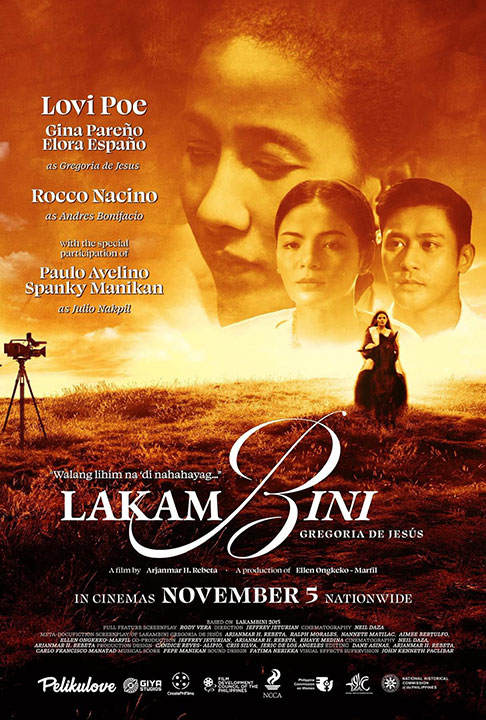
Upgrade to High-Speed Internet for only ₱1499/month!
Enjoy up to 100 Mbps fiber broadband, perfect for browsing, streaming, and gaming.
Visit Suniway.ph to learn
 THIS YEAR, new life will be breathed into the untold story of the Mother of the Philippine Revolution — in the form of a “docufiction” film, Lakambini Gregoria de Jesus, that was 12 years in the making.
THIS YEAR, new life will be breathed into the untold story of the Mother of the Philippine Revolution — in the form of a “docufiction” film, Lakambini Gregoria de Jesus, that was 12 years in the making.
Known as the Lakambini ng Katipunan, or muse of the Katipunan, Gregoria de Jesus is finally front and center in her own narrative. The film follows a slew of revolutionary era biopics centered on male heroes like Andres Bonifacio, Emilio Aguinaldo, Gregorio del Pilar, and Antonio Luna.
“Ang dami nang pelikula na iba’t iba ang anggulo, at mapapaisip tayo kung ano ang totoo (There have been so many films with different angles, that make us reflect on what is the truth),” the film’s director Arjanmar Rebeta told BusinessWorld at the sidelines of a press conference in Quezon City.
Gregoria de Jesus married Andres Bonifacio, the Supremo of the Katipunan and President of the Revolutionary Government, and played a major role in the revolution against Spain. After Bonifacio was killed, she married musician, composer, and general of the revolution, Julio Nakpil.
The film blends interviews and anecdotes from descendants, historians, and artists with an unfinished biographical movie first shot in 2015. This makes the film a “meta docu-fiction,” which is a safer bet for portraying historical truth compared to “fictionalized heroes,” according to Mr. Rebeta.
“Nag-aalangan ako nung una kasi hindi ko porma ang documentary, pero tinanggap ko dahil mas makatotohanan ito (I was hesitant at first because documentary isn’t my usual format, but I accepted the project because it’s more truthful that way),” he said.
Lakambini Gregoria de Jesus follows the titular character, also known as Ka Oriang, a patriot, warrior, and leader who served as the custodian of the Katipunan’s secrets and weapons. The film showcases her perseverance in confronting not only the Spanish colonizers, but also the political traitors among her own countrymen.
Produced by Ellen Ongkeko-Marfil and directed by Jeffrey Jeturian and Arjanmar Rebeta, the film’s initial shape in 2015 never took hold because it was rejected by the Metro Manila Film Festival (MMFF) that year.
“When we lost the big budget commitment from that, it was depressing. It took 12 years because I didn’t know what to do with the material. A feature film is costly, so I thought of a documentary, but I didn’t want a straightforward one because not many people watch those. Gusto ko talaga marinig ang boses ni Oriang (I really want Oriang’s voice to be heard),” Ms. Ongkeko-Marfil said.
With Mr. Rebeta’s pitch, the original biopic narrative included esoteric parts that turned it into a docufiction. “That’s when I thought, ‘this is it,’” she added.
150TH YEAR
The milestone coincides with the 150th birth anniversary of Gregoria de Jesus, which the National Historical Commission of the Philippines (NHCP) commemorated in May.
“Sabi ni Gregoria, “Alalahanin tuwina ang mga banal na aral ng mga bayaning nasawi dahil sa pagibig sa bayan.” Ang ginagawa natin ngayon ay napakahalaga sapagkat ito ang saktong ibinilin niya,” said historian Xiao Chua, who was a consultant for the film. (“Gregoria once said, ‘Always remember the sacred teachings of the heroes who died out of love for country.’ What we’re doing now is important because it follows exactly what she told us.”)
The quote is a reference to Ka Oriang’s “Ten Pieces of Advice to the Youth.” Mr. Chua added: “We have to remember the role of women like her in our history.”
Starring in Lakambini are Lovi Poe as Gregoria de Jesus and Rocco Nacino as Andres Bonifacio. The older and younger versions of Gregoria are played by Gina Pareño and Elora Españo, respectively. The late Spanky Manikan and Paulo Avelino portrayed the older and younger Julio Nakpil.
“Gregoria de Jesus’ life is a testament to resilience, enduring political betrayal, and immense personal struggle. Her unfinished quest for justice mirrors our own decade-long battle to bring her story to the screen,” Ms. Ongkeko-Marfil said.
She added that weaving the two narratives allows the film to demonstrate how “the struggles of the past are the inspiration for the present.”
“When we were rejected by MMFF, they told us there weren’t any ‘combat scenes.’ Is that what heroism is about? Combat?” she recounted. “We deserve to see the experiences of women, who bring different values to heroism.”
Supported by the NHCP, Lakambini has since sparked the proposal of a Lakambini Bill (House Bill 5332 filed by Akbayan Representative Dadah Kiram Ismula), following a screening of the film at Congress. If passed, it will institutionalize the teaching of Filipino heroines in all levels of public and private education in the country.
Lakambini Gregoria de Jesus premieres on Nov. 5 in cinemas nationwide. Those interested in block screenings may contact Pelikulove at pelikulove@gmail.com. — Brontë H. Lacsamana




